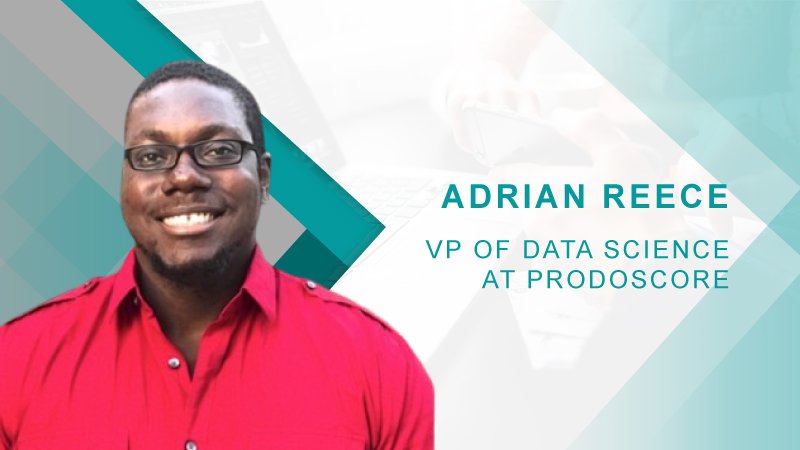Adrian, we’d love to hear more about your professional journey that has led you to your current role as the VP of Data Science at Prodoscore.
My journey to becoming the VP of Data Science at Prodoscore has been a fusion of hands-on experience across various fields and an academic grounding in organizational behavior. From my time in the military to entrepreneurship and then as a fitness coach, I have always been captivated by the power of data and feedback to influence human behavior and performance. My work as a research and data consultant, particularly in applying machine learning and people analytics, set the stage for me to contribute meaningfully to a data-driven organization like Prodoscore. Witnessing Prodoscore’s ability to collect high fidelity data in a CNBC news clip back in 2020 led me to realize the potential they had to operationalize theories in organizational behavior. After a few years consulting I made my transition to a full-time role.
Adrian, could you share your insights on how remote work has impacted workplace productivity and your perspective on the trends we should be mindful of?
Remote work has been a double-edged sword for productivity. While it provides a level of flexibility that can enhance work-life balance, it also introduces challenges in sustaining a cohesive team dynamic and vibrant company culture. Viewing this through an organizational behavior lens, hybrid work facilitates a delicate equilibrium, empowering deep, focused work—or “deep work” as Cal Newport terms it—while also accommodating the dynamic collaboration that fuels innovation and creativity. I believe technology will continue to play a pivotal role as it bridges the physical divide of distributed teams, allowing for both synchronous and asynchronous collaboration.
We’re intrigued by Prodoscore’s focus on workplace analytics. Would you mind providing some insights into how organisations can leverage data to enhance productivity, especially in managing remote teams?
Organizations looking to enhance productivity through data must first discern signal from noise. This begins with a clear understanding of desired outcomes and the factors that drive those outcomes. At Prodoscore, we leverage data to pinpoint which activities and behaviors correlate with high productivity. By focusing our data collection and analysis efforts on these areas, we help guide organizations to implement evidence-based strategies to manage their distributed teams effectively.
Managing the challenges of remote work is no small feat. Can you share any strategies or technologies you’ve found effective in maintaining or even enhancing employee productivity?
To address remote work challenges, I advocate for a blend of synchronous and asynchronous technology adoption. There’s an art to managing communication across time zones. Real-time meetings and discussions are invaluable, yet they’re not always feasible when some teammates live halfway across the world. To manage this we leverage tools that facilitate both types of communication such as email, chat, and google meets to ensure continuity.
The importance of unbiased workplace intelligence is clear. Could you share your thoughts on how organisations can ensure the data they collect remains unbiased and why this is crucial for informed decision-making?
Mitigating bias in workplace intelligence is all about rigorous methodological discipline. At Prodoscore, we ensure our data collection techniques are systematic and scientifically robust, reducing the impact of extraneous variables. We gather data directly from the API’s and are intentional in our data collection efforts to only analyze the data that directly serves to answer our core business question, what inputs help drive workplace productivity and how can we provide them to our customers in the most digestible way possible? We avoid collecting unnecessary demographic information and suggest other organizations do the same unless it’s crucial to the hypothesis being tested.
Drawing from your experience with workplace intelligence data, could you provide an example where such data significantly influenced a company’s positive direction or strategy?
Leveraging Prodoscore’s capabilities, we assisted one organization to analyze three months of employee activity data and tie it to performance metrics. By identifying patterns among top performers, we provided recommendations towards the creation of a mentorship program that strategically paired experienced high performers with newer employees needing support. Our approach personalized the organization’s employee development plan and capitalized on internal strengths for continuous improvement.
Adrian, as a leader in data science, we’re curious about the strategies you employ to stay ahead of industry trends and foster innovation within your team.
Staying current in the data science field involves a commitment to continuous learning, following sources like Bloomberg Technology and engaging with platforms like Medium and Towards Data Science. On our team, we foster a culture of knowledge-sharing by hosting forums where team members can share insights from various educational resources. By decentralizing our learning process, we create a synergistic and collaborative working environment where innovation flourishes.
Given your expertise, could you share your insights on how businesses can effectively align their data science strategies with broader organisational goals, particularly in this rapidly evolving landscape?
In order to align data science initiatives with the overarching business ambitions, it’s imperative that we prioritize metrics that directly reflect key business outcomes, rather than defaulting to convenient but less informative stand-ins. For instance, gauging productivity should go beyond surface level surveys and instead deeply analyze employee workflows to uncover actionable insights.
As data scientists, we must take the initiative to tackle the vital and sometimes difficult questions that drive business decisions. By taking a seat at the decision-making table we are able to unveil insights that may otherwise remain obscured to other leaders. Continual learning is a cornerstone of our field, and by subscribing to relevant industry mailing lists, we can remain informed of emerging techniques and theories.
For individuals aspiring to pursue a career in data science or workplace analytics, we would greatly appreciate any advice you can offer on navigating and thriving in this dynamic field.
For those entering the field of data science or workplace analytics, immerse yourself in the data. It’s not just about mastering statistical, programming, or machine learning skills, though they are essential, it’s about the innovative application of these skills. Be creative, curious, and disciplined in your approach to problem-solving. Continuously question, test, and refine your methods to develop a profound understanding of the data at your fingertips.
As we conclude, Adrian, what final thoughts or key takeaways would you like to share regarding workplace productivity, data intelligence, or emerging trends that businesses should consider embracing in the coming years?
Businesses should prepare for further advancements in AI and machine learning, which will enhance workplace data intelligence. Embracing analytics that respect employee privacy will be crucial for maintaining trust. With work structures becoming more flexible, adaptable analytic tools are needed. Additionally, prioritizing mental health and well-being through data-driven strategies will lead to healthier and more productive work environments. Despite technological progress, the human aspect remains central; technology should enhance, not supplant, human capabilities. While we embrace data intelligence, we must not forget the integral role of human intuition and interpersonal connections. It’s crucial for businesses to foster a symbiotic relationship between the convenience of new technologies and the innate strengths of people
Explore HRtech News for the latest Tech Trends in Human Resources Technology.

Adrian Reece VP of Data Science at Prodoscore
Adrian Reece is a seasoned Data Scientist and People Analytics Specialist with a profound ability to transform raw data into actionable insights. With a background that spans across various industries, including time spent as a fitness coach, serving in the US Navy, and multiple entrepreneurial endeavors, Adrian has developed a unique and versatile skill set that contributes to his invaluable expertise in data science and organizational behavior. Adrian's experience as an independent research and data consultant reflects his passion for utilizing a combination of machine learning, natural language processing, I/O psychology, and behavioral science techniques to drive effective decision-making within organizations. His success in creating data-driven competency models is a testament to his ability to apply these methodologies to inform workforce performance analytics and behavioral benchmarking. As the new Vice President of Data Science at Prodoscore, he hopes to further solidify his commitment to a data-driven approach to organizational advancement. He is currently pursuing a PhD in Organizational Behavior from Claremont Graduate University.

